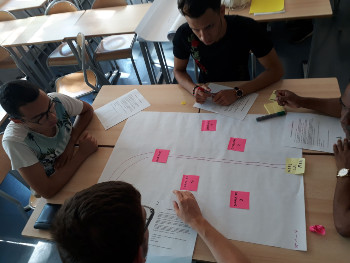
The central object of our analyses is the individual behaviour of the actors within socio-hydrosystems. Even though this behaviour takes place in groups, as it often does, we are interested in studying individual choices, the way they evolve, and the factors that influence them. This includes individual behaviours that take into account the strategies of other actors within a group (cooperative and non-cooperative equilibria, for example) and the effect of collective rules established by (endogenous) or imposed on (exogenous) groups. We also study if and under what conditions these individual choices influence the decisions made by the groups and by the institutions that manage the systems within which the actors studied operate and evolve.
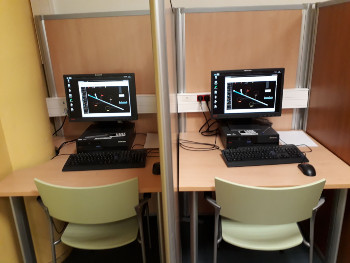 The team's work resides on three methodological references used to analyze practices, social representations and behaviours within socio-hydrosystems: quantitative-qualitative surveys, economic evaluation based on stated preferences, and economic experiments. To these references are added hybrid methods, including other disciplines such as social psychology. Hybrid methods constitute an objective per se for the team: to design new methods adapted to the specific situations of research in partnership within socio-hydrosystems.
The team's work resides on three methodological references used to analyze practices, social representations and behaviours within socio-hydrosystems: quantitative-qualitative surveys, economic evaluation based on stated preferences, and economic experiments. To these references are added hybrid methods, including other disciplines such as social psychology. Hybrid methods constitute an objective per se for the team: to design new methods adapted to the specific situations of research in partnership within socio-hydrosystems.
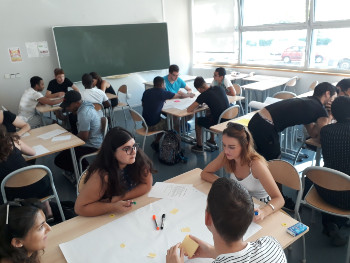
PRECOS is above all a methodological team. Consequently, the main questions concern the methods and research processes that can be mobilized in order to study the practices and individual behaviours of socio-hydrosystem’ actors. In particular, we address the following questions:
- How to adapt the proposed methods to the study of socio-hydrosystems?
- How to open-up the methods used by the team to interdisciplinary approaches?
- How to implement field experiments in situations where it is difficult to control behavioral variables, in particular in the South?
- How to combine experimental approaches with other methods of economic analysis or social sciences for research in support of decision-making for water management?
- What kind of experiments for water economics education?
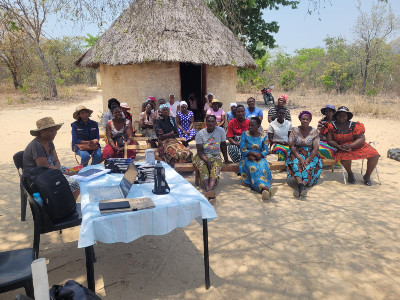 Within the projects, "thematic" research questions emerge. They concern the analysis of the behaviour of actors within socio-hydrosystems. Here are a few examples: what is the influence of information (institutional, social) on farmers' willingness to pay for irrigation water? What are the factors that influence the choice of an innovation (complementary irrigation basins for irrigation) in Burkina Faso or the choice of adaptations to the lack of water in Tunisia and Morocco?
Within the projects, "thematic" research questions emerge. They concern the analysis of the behaviour of actors within socio-hydrosystems. Here are a few examples: what is the influence of information (institutional, social) on farmers' willingness to pay for irrigation water? What are the factors that influence the choice of an innovation (complementary irrigation basins for irrigation) in Burkina Faso or the choice of adaptations to the lack of water in Tunisia and Morocco?
The team fieldworks are those of its members' projects. They range from Metropolitan France to the South of the Mediterranean, to the overseas regions where the UMR G-Eau researchers work. PRECOS partnerships are primarily scientific in nature, but taking into account the applied nature of its research and the orientation towards decision support, collaborations with institutions, political and private decision-makers, producer organizations and irrigators are in place.
© Photos : S. Farolfi, CIRAD
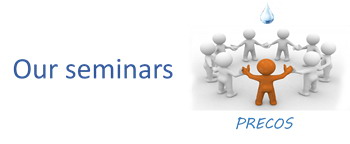
| 2025 | ||
| 06/11 |
Distributional Effects of Catch-Quota Management Regimes in a Heterogeneous and Uncertain Environment: An Experimental Investigation |
Zhi Li |
| 18/09 |
Experimenting Groundwater Governance : Assessing Policy Performance through Lab-in-the-field Experiments in Kebili Oases (Tunisia) |
Stefano Farolfi |
| 12/06 |
When nudges backfire: evidence from a randomised field experiment to boost biological pest control |
Philippe Le Coent |
| 15/05 |
Individual, Collective, or Both? Testing Payment Mechanisms to Enhance Adoption of Sustainable Land-Use Systems |
Amandine Belard |
| 13/03 |
The Validation of an Economic Model with Stakeholders: Insights from the Talanoa Water Project |
Juliette Le Gallo |
| 2024 | ||
| 23/05 |
Harvesting Hope: Climate Shocks and Religion in Sub-Saharan Africa |
Aisha Bashir and Eva Raiber |
| 28/03 |
Government fertilizer subsidies, input use, and income: The case of farm households in Senegal Summary - Presentation |
Aymeric Ricome |
| 25/01 |
EVABIO Project Results: Measuring and Understanding the Impact of Environmental Educational Games |
Emmanuel Dubois |
| 2023 | ||
| 09/11 |
Réseaux de vérification et diffusion de connaissances agroécologiques traditionnelles ? |
Julien Malard |
| 26/06 |
Social capital and targeted beneficiaries of a development project: A lab in the field experiment in rural Zimbabwe |
Amandine Belard |
| 23/05 |
Framing environmental transitions. How policy actors perceive social-ecological interdependencies? |
Thomas Bolognesi |
| 30/03 |
Stated preferences for the evaluation of land use dynamics using hybrid modelling Appréhender le consentement à payer pour la recharge de la nappe de Crau via un jeu sérieux |
C Hérivaux - Ph Le Coent (BRGM) S Morardet
|
| 2022 | ||
| 24/11 |
Collective Decision Making and Uncertainty in Natural Resources: The Role of Relational Quality to Increase Cooperation among Actors |
M. Brugnach |
| 27/10 |
Projet Eva-Bio : Mesurer et comprendre l’effet de jeux ludo-éducatifs à thématiques environnementales sur les changements d’attitudes, de représentations et de comportements |
E. Dubois |
| 21/04 |
Retours d’expériences sur l’utilisation de la méthodologie-Q |
J. Rouillard, D. Jourdain |
| 24/03 |
Mesurer l’attitude des agriculteurs face au risque : le cas de la gestion individuelle des quotas d’eau dans trois périmètres élémentaires du Sud-Ouest de la France |
L. Schneider |
| 2021 | ||
| 03/12 |
Séminaire débat - L’économie expérimentale est-elle utile à la recherche pour le développement ? Programme - Intro_Willinger - Bougherara Presentation - Farolfi Presentation - Instructions Surprise Exp - Results Surprise Exp |
S. Dury, T. Le Cotty, M.Willinger,
D.Bougherara, S. Farolfi
|
| 14/10 |
Usage des méthodes quantitatives en psychologie sociale pour l'étude des attitudes et des représentations sociales |
P. Rateau, D. Priolo |
| 08/07 |
Restitution des avancées du groupe de travail sur l'évolution de l’outil ACB-DCE |
M. Favre |
| 08/04 |
Natural landscape or cycling facilities: what are ViaRhôna users looking for? |
S. Morardet |
| 11/02 |
Introducing nature into cities or preserving existing peri-urban ecosystems? Analysis of preferences in a rapidly urbanizing catchment |
C. Hérivaux, Ph. Le Coent |
| 2020 | ||
| 22/09 |
Building new kinds of meta-models to analyse experimentally (companion) modelling processes in the field of natural resource management |
B. Bonté |
| 18/06 |
Le compteur communicant : Perception des irrigants – le cas du bassin du Louts |
P. Garin, M. Montginoul |
| 25/05 |
Supplemental irrigation from farm ponds to mitigate rainfall variability in the Sahel: Farmers’ preferences and Institutions’ goals in Burkina Faso |
R. Ouedraogo |
| 21/04 |
The building of social capital in rural communities through a development project. A lab-in-the-field analysis in the Limpopo province of South Africa |
D. Jourdain, S. Farolfi |
| 12/03 |
Can nudges increase the effectiveness of payments for ecosystem services? Evidence from a randomized experiment |
Ph. Le Coent |






